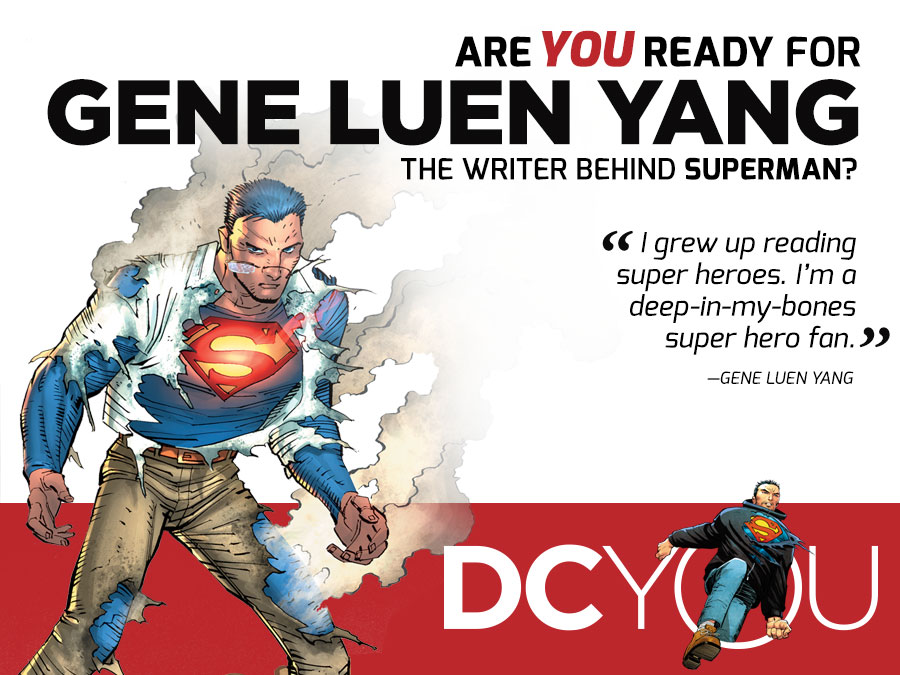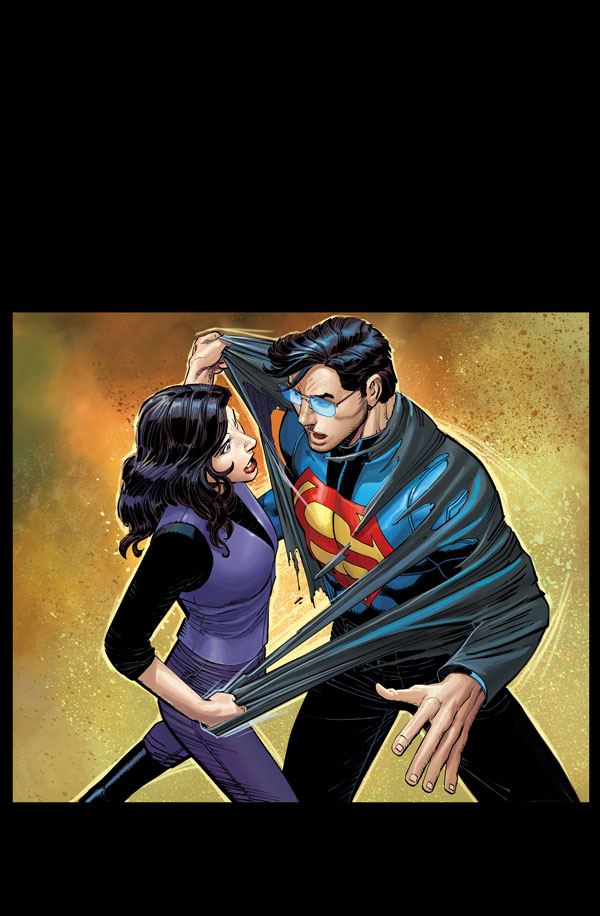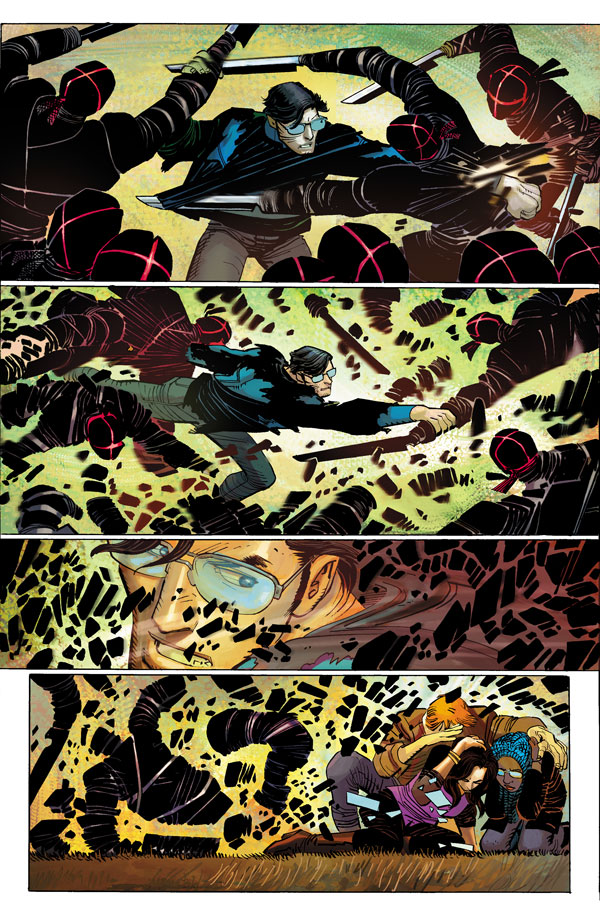
 With a secret identity that’s no longer so secret and super powers that are all but gone, it’s safe to say that Superman has gone through some pretty hefty changes since his monthly comics returned in June. However, one of the biggest has been behind the scenes. While the instantly recognizable art is still the work of John Romita, Jr., the writing is now the work of Gene Luen Yang, an award-winning comic writer (American Born Chinese, Avatar: The Last Airbender) who has only recently turned his considerable writing talent to the world of super heroes. We spoke with Gene recently to ask how he found himself writing the Man of Steel and discuss the important role the immigrant experience has played in creating many of the world’s super heroes.
With a secret identity that’s no longer so secret and super powers that are all but gone, it’s safe to say that Superman has gone through some pretty hefty changes since his monthly comics returned in June. However, one of the biggest has been behind the scenes. While the instantly recognizable art is still the work of John Romita, Jr., the writing is now the work of Gene Luen Yang, an award-winning comic writer (American Born Chinese, Avatar: The Last Airbender) who has only recently turned his considerable writing talent to the world of super heroes. We spoke with Gene recently to ask how he found himself writing the Man of Steel and discuss the important role the immigrant experience has played in creating many of the world’s super heroes.
Gene, you obviously have a ton of comic writing experience, but writing a traditional super hero comic is relatively new ground for you. Is this something you always wanted to do?
I grew up reading super heroes. I’m a deep-in-my-bones super hero fan. I’ve got to be honest, when I was a kid, I read more Marvel than DC. But I did love the Justice League from the ‘80s and ‘90s. It was more of a sitcom and I thought that was awesome. I also loved the Vertigo stuff. But super heroes have always been in my subconscious and only recently have they been coming out. I started in the indie side of comics, but super heroes have always been there.
You wrote Avatar: The Last Airbender…
Yes, and that’s not straight super heroes, but it has a lot of overlap with the genre.
Would you say that was the bridge to writing super hero comics?
No, I think super heroes have always just been in there. I feel like super heroes have influenced even my creator-owned stuff.

Is this the first super hero comic you’ve written?
I did a creator-owned project called “The Shadow Hero” that came out last year. I worked on it with an artist named Sonny Liew who’s now also working for DC. He’s drawing Doctor Fate. Together we revived this old super hero from the 1940s called the Green Turtle. He’s in the public domain now. Have you heard of him?
No, I haven’t!
The Green Turtle is rumored to be the first Asian American super hero. He was created by an artist named Chu Hing who was one of the first Chinese-Americans to work in the American super hero comic market, and there’s a rumor that he wanted to make his character Chinese-American, but his publisher wouldn’t let him do it. Sonny and I kind of explore that in our book.
And now you’re writing Superman. That’s a pretty big character to tackle next. He’s arguably the most famous super hero out there.
He’s the one who started a whole genre! His comic was so successful.
Was there any intimidation with writing a character like that?
Heck yeah, it was intimidating! It was crazy intimidating. I got stomach aches because I was so intimidated. But I think a lot of things helped. One of the things was that I would get to work with John Romita, Jr., who is a legend. If people don’t come to the book for me, they’re going to come for John. And second is that I work with a larger team. There are four books. We want them to be interlocking. Not interdependent, but interlocking. I’m good friends with Greg Pak and he walked me through a lot. Eddie Berganza, my editor, has been amazing. It’s been a really great experience. I feel like I’ve learned a lot since signing on to do Superman.
Since you brought it up, it’s fun to see how the books do interconnect together. How many issues will it take for your story to get to some of the events—the loss of Superman’s power, making his secret identity public—that the other books are reacting to?
The first storyline, “Before Truth,” runs from issue #41-#44. At the end of #44, we’ll see Superman the way he is in Action Comics #41—a depowered, exposed Superman.
What we’re really trying to do is get to the core of who Superman is. So we’re taking away a lot of his iconic visuals—we took away the spit curl, the cape. We left him with just the “S” and even that’s not the same, it’s more of the Fleischer “S” from the old animation.

So how did this whole thing happen? Did DC reach out to you? Did you reach out to them?
DC’s reached out to me a couple of times and it’s just never worked out schedule-wise. But in December, my agent had a talk with Dan DiDio. I have no idea what happened in that talk, but when they were done my agent called me and asked, “How would you feel about writing Superman?”
Personally, what do you like best about the Man of Steel?
I have a love of super heroes in general. I started collecting super heroes in the fifth grade and I just loved them. But now as an adult, I look back on that and I wonder if some of it has to do with my being a child of immigrant parents. Superman, Batman, even the heroes from the competition—they were all created by these children of Jewish immigrants. I feel like they’ve embedded parts of their experience into the genre. And Superman himself is literally an immigrant.
I was wondering if that was something that resonated with you.
Yeah. As an immigrant’s kid, I spoke Chinese at home and English at school. I had two different names. I felt like I was living under two different cultural expectations. Super heroes are the same way. They have two different names. They have to operate under two different sets of rules. I’d say that’s the piece of Superman that I like the best. That’s what resonates with me the most.
Are there other DC super heroes you have interest in? Maybe characters you’d like to have make an appearance in Superman or that possibly down the line you’d love to get a shot at writing?
I’ll just tell you the ones that I like as a fan. I’ve always liked the Fourth World, especially Mr. Miracle. I think he’s probably my favorite. I’ve also always liked Martian Manhunter. I think it’s partly for the same reason—he has to deal with these two different identities. And I’ve always liked the Wonder Twins.
The Wonder Twins?
I’ve always liked them! I actually have a secret theory about the Wonder Twins that they’re really Filipino-Americans. They came about in the 1970s when Filipino-American super heroes wouldn’t have been a concept, so they made up this Exxor thing as a way of covering that.
SUPERMAN #42 by Gene Luen Yang, John Romita, Jr. and Klaus Janson is available this week in print and as a digital download.




















